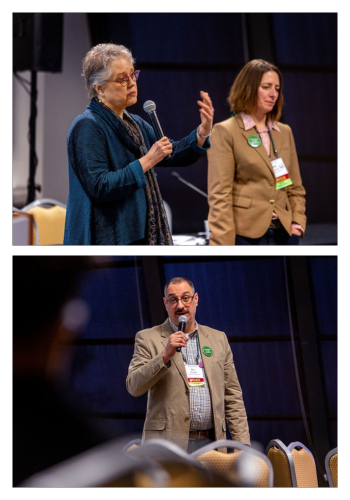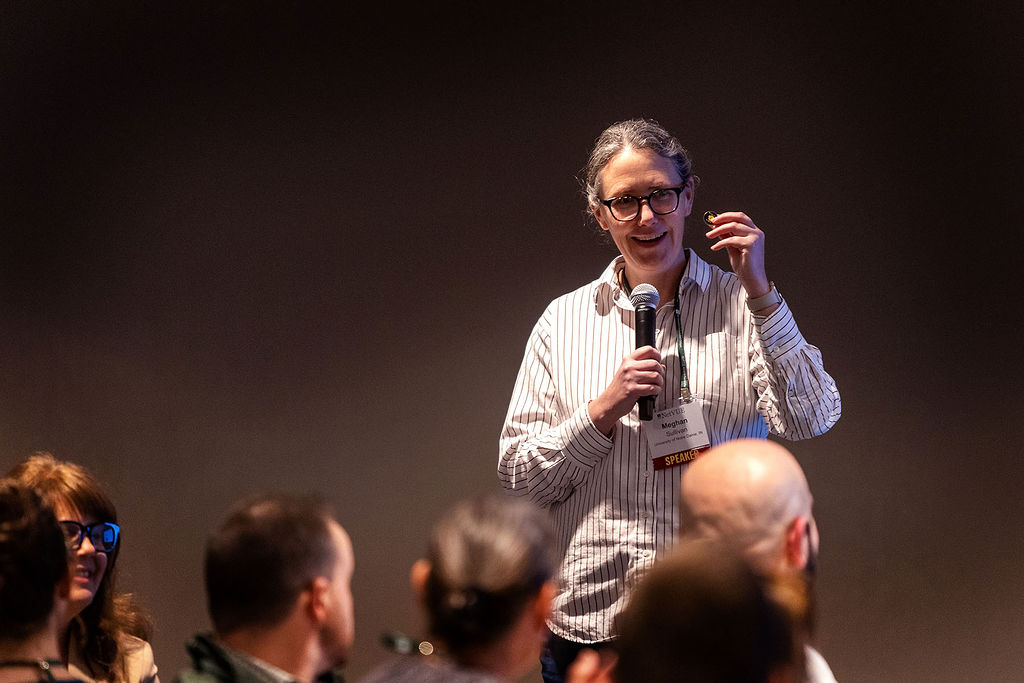Carter Aikin, Rachael Baker, Krista Hughes, and Erin VanLaningham
The concurrent workshops were designed to bring together leaders and experts from different institutions who are working on similar themes. This piece highlights four of the nine sessions that considered the unique needs that different student populations may have in their pursuits of meaningful lives.
Many member institutions are paying attention to the unique opportunities and challenges that college athletes face in navigating their sport, academics, and future directions. So, how does athletics really shape the character, life-philosophy, and vocation of our students? For so many of us who have student-athletes under our care, this question presses urgently as we seek to find ways of integrating athletic life into mentorship. A concurrent workshop on “Vocation and College Athletes” offered plenty of food for thought, especially about how deeply most student-athletes associate their athletic activity with their overall identity (which research indicates is as powerful in Division III athletes as it is among Division I athletes). Panelists encouraged us to conduct a mental audit of our campuses, seeking the barriers that prevent good mentoring in athletic spaces and coordinating our work with other mentors on campus. We were also invited to consider the grief and heavy transitions that our student-athletes experience as three losses happen for them simultaneously upon graduation: 1) the loss of mentors (coaches) who were solely focused on one facet of their becoming and a robust piece of their identity; 2) the loss of a significant community of support with which they shared triumphs, failures, and many hours of mutual formation; and 3) a profound loss in their sense of self and their value in wider communities of purpose. Yet it is encouraging to realize that student-athletes have received tools for vocational discernment and receptivity that other students under our care have not necessarily received, such as the experience of public failure in the context of a community focused on leveraging loss toward learning. Like so many other student learning experiences, athletic experiences are only as valuable as the teaching and mentoring coordinated with them. How will you build bridges to better coordinate mentoring to further leverage the formation (and unusually heavy transitions upon graduation) unique to our student-athletes?

A concurrent workshop on “Accompanying Queer Students through Vocational Discernment” invited participants to consider the challenges of and possibilities for guiding LGBTQIA+ students through vocational exploration. Grounding the session in sobering statistics about a hostile socio-political climate and LGBTQIA+ young people’s mental health, the panelists discussed the shifts in theoretical and theological frameworks that educators can undertake to affirm, explicitly and implicitly, queer students’ dignity and beauty. Advocating an intersectional and queer-informed approach that improves campus climate and outcomes for all students, panelists shared a range of concrete strategies for supporting LGBTQIA+ students, which included becoming more literate in areas that impact queer students (e.g. gender identity, gender binary, microaggressions, pronouns); assessing one’s vocation resources for elements of cis-heteronormativity, transphobia, racism, and ableism; establishing sanctuary spaces; identifying and redressing institutional barriers; and simply engaging in one-to-one conversation early and often.
The concurrent workshop on “Race, Class, and Belonging in Vocational Discourse” began with panelists sharing their stories of experiencing a lack of belonging at their institutions; their stories foregrounded how difficult it can be to separate one’s identity or story from the work that one does with colleagues and students. Panelists offered important questions for teams to bring back to their campuses to facilitate conversations about supporting faculty members, staff members, and students in bringing their whole selves to explorations of purpose and vocation. Those questions included:
The Animating Spark for Your Work
- How have your core values brought you to your current work?
- How well are you able to act on the values that move or animate you most in your work?
Institutional Barriers to Thriving
- What parts of yourself have had to be suppressed or “code-switched” out of existence in your workplace?
- What elements of organizational culture and institutional life have constrained people’s ability to be fully themselves at your institution?
Imagining Conditions for Thriving
- What conditions or elements are needed for people to be able to bring themselves fully into university life at your institution?
- What tools, support structures, and changes are needed to help this happen?

The lineup of concurrent workshops also included a session led by keynote speaker Meghan Sullivan and focused on the necessary centrality of ethics for students who are navigating many competing interests and influences. She led a packed session on how to teach difficult and important topics to undergraduates, drawing on her course at the University of Notre Dame, “God and the Good Life.” She stressed that these teaching projects are an important part of our callings and that such courses are ways that our work can have real and lasting impact by reaching students across the university. The goals of her course are to show students that philosophy is everywhere in daily life and to teach the reasoning skills for approaching difficult questions and concerns successfully. Sullivan also shared how they train peer leaders to lead dialogue in weekly student meetings. The two topics of the workshop with which we wrestled included an “Ask an Ethicist” column about how a single parent’s financial support of her adult child was donated by the child to help a homeless person in need, and an exploration of the question: If money and career placement were not concerns, then what major and career would you choose, and why?
These four sessions highlighted the importance of working with individual student stories, backgrounds, contexts, expectations, and needs. College campuses are complex, and applying ideas in broad strokes for all on campus can be appealing, but these sessions demonstrate the danger of doing so. Workshop leaders encouraged us to consider which students are encountering vocational programming at our institutions and which students are being missed. We should also consider the specific conversations that need to occur, as well as the postures of curiosity that we should take, in order to build paths into new communities on campus. Some of these groups may need different kinds of invitations if they are to participate in programming and to reflect on vocational questions.


